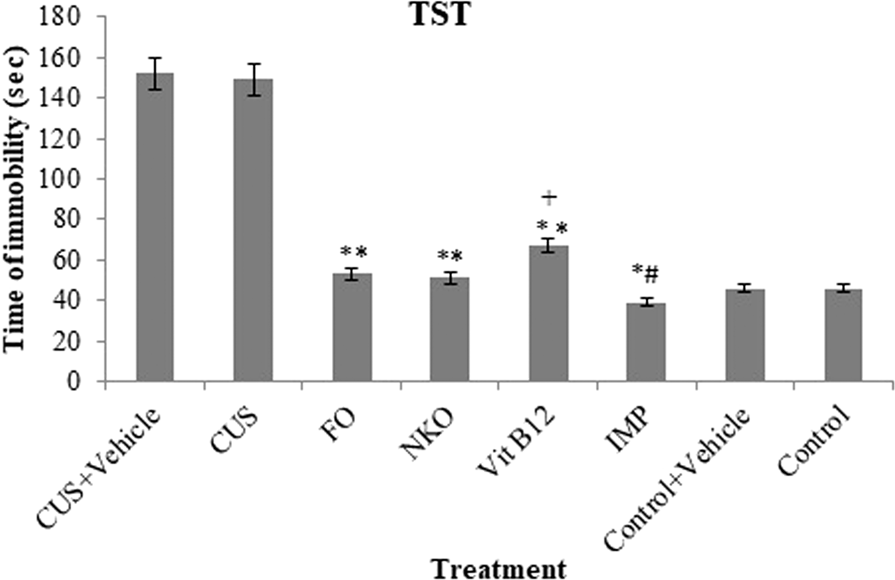Learn about brain health and nootropics to boost brain function
Antidepressant–like effects of fish, krill oils and Vit B12 against exposure to stress environment in mice models: current status and pilot study

Oxidative stress has significant role in pathophysiology of any kind of depression through actions of free radicals, non-radical molecules, and unbalancing antioxidant systems in body. In the current study, antidepressant responses of fish oil (FO), Neptune krill oil (NKO), vitamin B12 (Vit B12), and also imipramine (IMP) as the reference were studied. Natural light was employed to induce stress in the animals followed by oral administration of the drugs for 14 days. The antidepressant effect was assessed by tail suspension test (TST) and forced swimming test (FST), antioxidant enzymes and oxidative stress markers were then measured in the brain tissue of the animals. The administration of FO and NKO could significantly reduce the immobility of the animals; while, increasing climbing and swimming time compared to the normal saline in CUS-control group in TST and FST, similarly to IMP but not with Vit B12. Vit B12 could not effect on SOD activity and H 2 O 2 level, but, cause decrease of the malondialdihydric (MDA) level and CAT activity, as well as increased the GPx and GSH activities. The rest treatments led to decrease of MDA, H 2 O 2 levels and CAT activity and increase of GPx, SOD, GSH activities. Introduction
Depression is a chronic and devastating psychological complaint that millions of people suffer. Since 1950s up to the present time, antidepressants only have treated this disorder based on serendipitous alteration through the monoamine neurotransmitters, such as serotonin or noradrenaline. However, fundamental patho-physiological mechanisms of such illness are not fully understood 1 , 2 , but different pharmacologic therapeutics have been recently developed for managing depression 3 . It is demonstrated that administration of natural antidepressants in induced stress rodents are able to alleviate related symptoms 4 , 5 . Physicians are encouraged to search for natural compounds as effective drugs due to their lower side effects compared to the chemical drugs. For instance, recent findings show that omega-3 fatty acids are able to improve depression and anxiety, effectively without having serious adverse effects 6 . In addition, it is well understood that n-3 polyunsaturated fatty acids (n-3 PUFAs) which include eicosapentaenoic acid (EPA) and docosahexaenoic acid (DHA), possess some bioactivity effects, such as, anti-inflammatory, anti-nociceptive, antioxidant, anti-depressant, anti-anxiety, anti-cardiovascular, etc. 7 , 8 . For instance, brain is made up to 60% of different lipids which are mostly made of PUFAs, particularly, DHA 9 which contribute to healthy brain and improve variety of brain functions, such as memory and learning 10 , 11 . Bloch and Hannestad 12 demonstrated that EPA and DHA contain only a little or even no-significant antidepressant effects, without having any noticeable differences. However, Sublette et al . 13 suggested that only those supplements which consist of EPA ≥ 60% of the total EPA and DHA possess an effective anti-mild-depressant activity. It is reported that either fish oil or krill oil which is extracted from small shrimplike planktonic crustacean of open seas, possess high level of essential polyunsaturated lipids, EPA and DHA 14 . In addition of fatty acids, some vitamins have shown to possess mild antidepressant effect and are prescribed by physicians to improve patient’s depression and anxiety. As an example, administration of Vit B12 as an exogenous antioxidant at dose of 1 mg/daily to those patients suffering from depression [20] can improve variety of symptoms of mental and depression disorders 15 .
To study effectiveness of drugs as antidepressant in rodents, some distinctive and clear depressive like behaviours before and after treatments have been suggested to be assessed with some reliable tests, such as tails suspension (TST) and forced swimming tests (FST). In FST, novel antidepressant drugs in comparison with the control group could reduce immobility in animals. Also, some other behaviours, such as swimming and climbing are strongly suggested to be scored separately 16 . Swimming time is increased by selective serotonin reuptake inhibitors, on the contrary, climbing is motivated by selective norepinephrine reuptake inhibitors. In both tests, the immobility time of animals is related to the state of depression which is expected to decrease by using effective antidepressants 17 .
The role of ROS, such as H 2 O 2 or MDA which are formed from lipid peroxidation of polyunsaturated fatty acids in depression is strongly highlighted 18 , 19 , 20 and show to associate with lowering antioxidant defence or failure to repair oxidative damage. In order to eliminate the harmful effects of oxidative stress, body can get benefit from both endogenous and exogenous antioxidant systems 21 , 22 . Studies show that antidepressants affect antioxidant systems in brain to subside of free radicals to alleviate the symptoms of such disorders 23 , 24 .
In the present novel work, antidepressive-like-effects are evaluated in four different groups of animals which are treated by IMP, FO, NKO, Vit B12 to find their different actions against depression. Also, SOD, CAT, GPX, and GSH activity (major endogenous antioxidant enzymes) and also MDA and H 2 O 2 level (oxidative stress markers) of the hippocampal of the experimental animals are assessed. Also the effect of the compounds on the enzymatic systems is evaluated to find out their connection to antidepressant-like effect. Furthermore, the aforementioned activities of FO and NKO are compared together and to a moderate natural antidepressant (Vit B12) and also to imipramine as a strong chemical antidepressant.